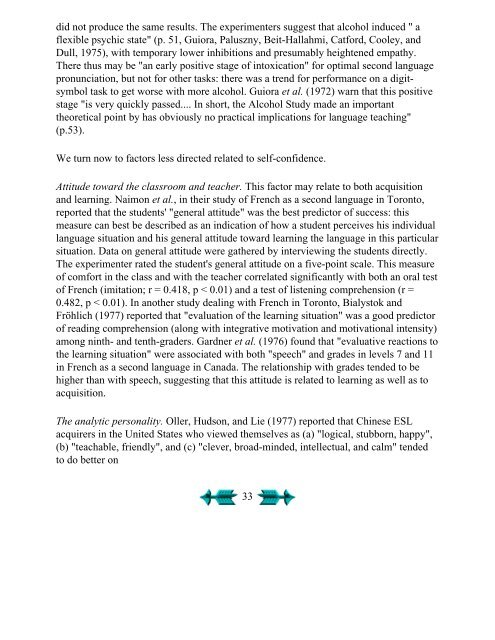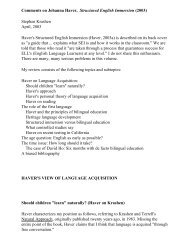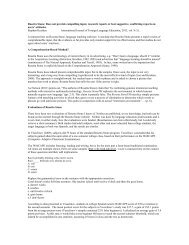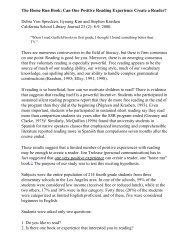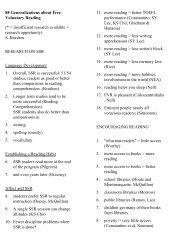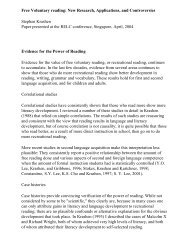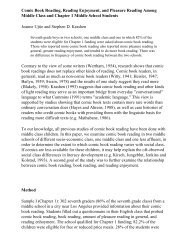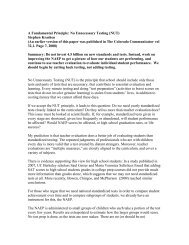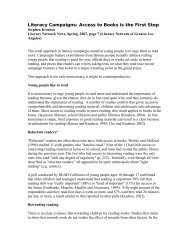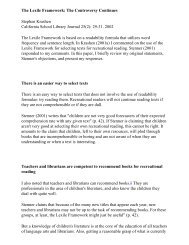Second Language Acquisition and Second ... - Stephen Krashen
Second Language Acquisition and Second ... - Stephen Krashen
Second Language Acquisition and Second ... - Stephen Krashen
Create successful ePaper yourself
Turn your PDF publications into a flip-book with our unique Google optimized e-Paper software.
did not produce the same results. The experimenters suggest that alcohol induced " a<br />
flexible psychic state" (p. 51, Guiora, Paluszny, Beit-Hallahmi, Catford, Cooley, <strong>and</strong><br />
Dull, 1975), with temporary lower inhibitions <strong>and</strong> presumably heightened empathy.<br />
There thus may be "an early positive stage of intoxication" for optimal second language<br />
pronunciation, but not for other tasks: there was a trend for performance on a digitsymbol<br />
task to get worse with more alcohol. Guiora et al. (1972) warn that this positive<br />
stage "is very quickly passed.... In short, the Alcohol Study made an important<br />
theoretical point by has obviously no practical implications for language teaching"<br />
(p.53).<br />
We turn now to factors less directed related to self-confidence.<br />
Attitude toward the classroom <strong>and</strong> teacher. This factor may relate to both acquisition<br />
<strong>and</strong> learning. Naimon et al., in their study of French as a second language in Toronto,<br />
reported that the students' "general attitude" was the best predictor of success: this<br />
measure can best be described as an indication of how a student perceives his individual<br />
language situation <strong>and</strong> his general attitude toward learning the language in this particular<br />
situation. Data on general attitude were gathered by interviewing the students directly.<br />
The experimenter rated the student's general attitude on a five-point scale. This measure<br />
of comfort in the class <strong>and</strong> with the teacher correlated significantly with both an oral test<br />
of French (imitation; r = 0.418, p < 0.01) <strong>and</strong> a test of listening comprehension (r =<br />
0.482, p < 0.01). In another study dealing with French in Toronto, Bialystok <strong>and</strong><br />
Fröhlich (1977) reported that "evaluation of the learning situation" was a good predictor<br />
of reading comprehension (along with integrative motivation <strong>and</strong> motivational intensity)<br />
among ninth- <strong>and</strong> tenth-graders. Gardner et al. (1976) found that "evaluative reactions to<br />
the learning situation" were associated with both "speech" <strong>and</strong> grades in levels 7 <strong>and</strong> 11<br />
in French as a second language in Canada. The relationship with grades tended to be<br />
higher than with speech, suggesting that this attitude is related to learning as well as to<br />
acquisition.<br />
The analytic personality. Oller, Hudson, <strong>and</strong> Lie (1977) reported that Chinese ESL<br />
acquirers in the United States who viewed themselves as (a) "logical, stubborn, happy",<br />
(b) "teachable, friendly", <strong>and</strong> (c) "clever, broad-minded, intellectual, <strong>and</strong> calm" tended<br />
to do better on<br />
33


